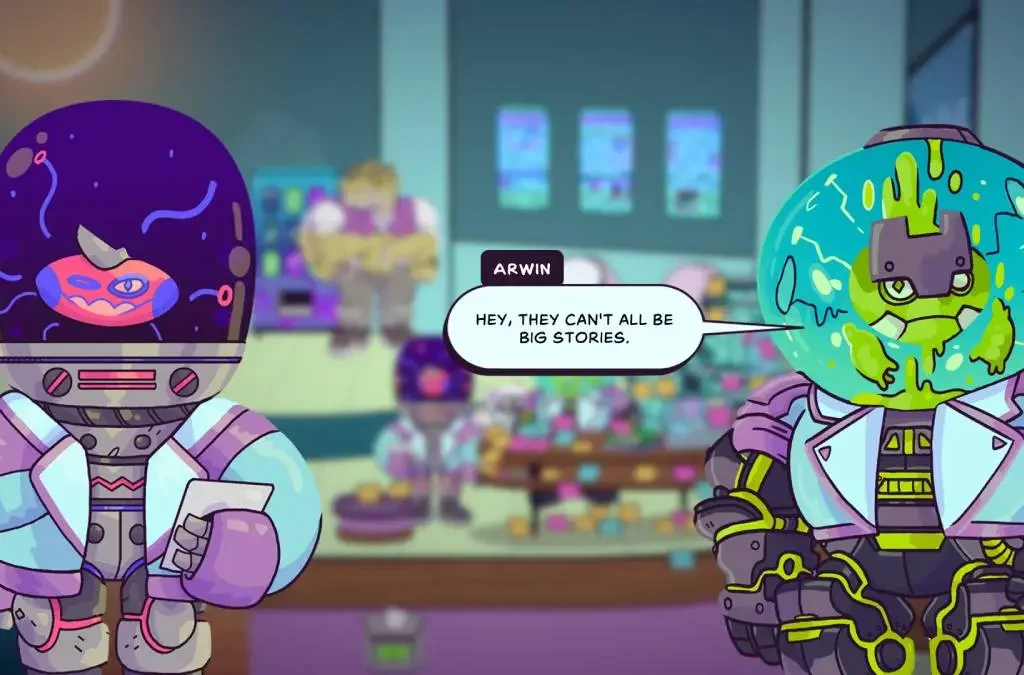Review: Times and Galaxy
Times and Galaxy, a game about a robot performing intergalactic journalism from a spaceship, is built on a funny premise – that journalism will remain, basically, the same in the distant future. You’re a robot reporter, but you’re still interviewing witnesses, organising information, figuring out headlines and ledes that hit the right mix of informative and salacious to sell papers.
Times and Galaxy is a lighthearted game, but it’s also one that, crucially, takes the work of its robot journalist seriously. I found myself putting real thought and care into how I practiced journalism in the game, even though it often felt like there was no real material reward for doing so beyond the satisfaction of doing a job well.
You play as the first robot to ever write for the titular Times and Galaxy newspaper, and it’s up to you to decide what kind of reporter they’re going to be. The robot – who you design at the start of the game – will be dispatched to various developing stories to interview witnesses, collect accounts from participants, and observe the environment to determine what the story is – and what details are best left off the page.
Times and Galaxy‘s stories develop across multiple planets, and between different species. You might be dropped into a court case between two aliens representing different ideologies, or check in on a potentially fluffy story that has a bit more going on under the surface (think “interstellar dog show”), or look into the scene of a crime that hasn’t yet been solved. Witnesses and passers-by will usually only speak to you once, so the choices you make during those conversations – and even the order in which you have them – is crucial to what kind of story you can end up writing.
From there, you’re given options for how to assemble your story, with each detail from headline down aligning to one of three core functions – your articles can be informative, they can be sensationalised, they can capture tales of human/alien interest, or they can be a good mix of all three. Your journalistic instincts will guide which direction you go in, and whether you boost the paper’s reputation and readership in the process. After talking to everyone, it’s up to you to determine what should be reported, plus whether you should protect your sources, or quote indiscriminately.
In truth, a lot of the more complicated calculations that go into this are likely to happen in your head rather than on the screen.The game is fairly prescriptive, telling you exactly which facts align to which statistics, and how they’ll impact your readership and reputation. Making a “good” story is as straightforward as talking to everyone and then picking the lines with the right numbers next to them. But still, I found the pursuit of journalistic integrity interesting – and sometimes I’d include a line that was not going to benefit my score because it felt more pertinent to the story.
As someone who has worked in journalism, I was surprised at how well the game captured the actual mechanics of reporting. Knowing when to ask a pointed question, and when to comment on what your subject just said; understanding who to trust, who to quote, and who is wasting your time; identifying the “real” story running through the incident or event you’re looking into – these are all elements to consider while playing. Times and Galaxy is not a complicated game, yet it manages to capture this complicated process effectively.
The writing in Times and Galaxy is lively and entertaining. The sci-fi world is well sketched-out, with the game’s writers putting a lot of time and effort into building out the politics and rules of different species. Because the game is based around choices – including which stories you pursue – there’s a lot of scope for playing it through more than once, trying different approaches and seeing what happens.
As firmly as Times and Galaxy has its tongue in its cheek – there’s a whole mechanic where you can flirt with all of your colleagues, including various other robots with different jobs and purposes, for instance – the game still feels like a proper tribute to the importance of good journalism, now and into the future. Reputation, the game repeatedly tells you, is more important than readership – a good stance for a fairly niche game made with obvious love and care to take.
Times and Galaxy is available now on PC, PS5, Xbox Series X/S and Nintendo Switch. A review copy for Nintendo Switch was provided by the publisher for review.
James O’Connor has been reviewing games since 2008.












